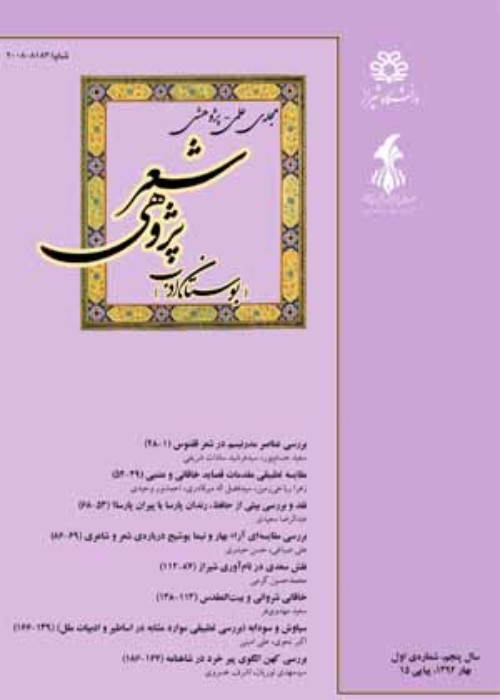Complement to the Divan of Bosḥāq Atema Shirazi
One of the most famous poets known by the nickname "Bosḥāq" is Jamal al-Din (Fakhr-al-din) Abu Ishaq Hallaj Shirazi. We know Bosḥāq Atema ( 827 or 830 A.H. ) with his Contradictions. The focus of Bosḥāq's contradictions is the description of different types of food. Apart from the contradictions of his verse and prose, Bosḥāq has a collection of poems (about 700 verses) that are not based on types of food. A copy of this collection is in Malik National Library, N 4842. Most of the poems in this collection are mixed with mystical terms and concepts. New Fahlavi poems are also included among the poems in this collection, and we know that Bosḥāq has many Fahlavi and Shirazyat (Poems in Shirazi dialect) poems in Divan Atema. In this article, we will examine this collection and the reasons for its attribution to Bosḥāq Atema.
There are many prints of Bosḥāq's works. The first edition was published in 1302 A.H. together with Divan-e-Albase with the correction of Mirza Habib Isfahani, and after him it was published twice, one in the years after 1320 A.H. [the exact date of this publication is not known], and the same edition was published by Kanoon-e-Marefat in 1360, and in 1392, Azarm reprinted it. In 1382. Mansour Rastegar-fasaei made another correction and it reached the third edition in 1397. In 1392, Mirza Habib's edition was published with a new edition and the title "Description of food" by Mohsen Azarm. The prints of Bosḥāq's works contain only a part of his collection of works and none of them are complete and contain at least two thirds of his works. By examining this collection, we sought to find out another aspect of Bosḥāq's poetic personality that no one has mentioned so far. Also, by analyzing the intratextual and extratextual signs of these poems, we enumerated the reasons for assigning them to Bosḥāq.
Discussion and review:
The manuscripts of Bosḥāq's works were not carefully read in the previous Prints, and there are many poems and verses in them that are not available in the printed editions. Among them, there is a collection of Bosḥāq's works numbered 4842 in the Malik National Library, among which there is a collection of poems containing about 700 verses that have been overlooked by researchers in this field. The poems of this collection can be included in the section: the section that begins with praise God and then praise the prophet and praise Abu Bakr and Ali. The other part is the poems that are written like these poems with the nickname of "Bosḥāq" but they often have Stable meanings, poetic and thoughtful and verbally stable and include all kinds of poetry in different formats. Most of these poems include good Ghazals. This second part contains poems by Bosḥāq that show his poetic power in various poetic formats and other subjects other than contrasts, but for some reasons these poems have been forgotten. Because on the one hand, the originality of Bosḥāq's contradictions, which became famous in the poet's own time and entered the works of his contemporaries as a poetic witness, made him stand out as a poet of contradictions, and his contradictions found followers. On the other hand, Bosḥāq's serious poems had a smaller volume compared to the contrasts. Despite this, one cannot ignore the power of Bosḥāq's imagery in the short poems of this collection or his lyrical art in these poems. In the text of these poems, we can find signs that can be used to identify the poet of the poems and to be sure about their affiliation to Bosḥāq Atema Shirazi. Among these are: the mention of the nickname of "Bosḥāq" in almost all verses, the use of titles mentioned for Bosḥāq in his works, such as "Morshid" and "Hallaj", referring to the poet's rhythm and prose, signs of poet's contradictions, the existence of poems or The fresh verses of the studied collection are found in other manuscripts of the works of Bashaq Atameh and named after him, the existence of some verses of this collection in the Dictionaries named Bosḥāq Atema, geographical references to Fars - the poet's birthplace and residence - and its cities, the foods that Bosḥāq liks and verses similar to Bosḥāq's works.
We know BosḥāqAtema Shirazi with his contradictions, but this poet of the Timurid dynasty, apart from the contradictions of his verse and prose, has a collection of poems that, unlike his other poems, is not based on the theme of food and is mixed with mystical themes, and sometimes historical-geographical information andsometimes it has humorous elements.This collection contains about 700 verses of Persian and Fahlavi poetry, in various formats and shows another aspect of Bosḥāq's literary personality that no one has addressed so far.Intratextual clues and other secondary sources show that this collection of 700 verses belongs to Bosḥāq.Examining these poems shows that they are good and not good, many of the poems in this collection are lyrical poems with a strong structure and thoughtful meanings, and another part are Sufi poems that are inferior to lyrical poetry in terms of structure and meaning.The large number of good poems in this collection, compared to inferior poems, shows the power of Bosḥāq's poetry.
Bosḥāq Atema , New Poems , Verses , introduction , review
- حق عضویت دریافتی صرف حمایت از نشریات عضو و نگهداری، تکمیل و توسعه مگیران میشود.
- پرداخت حق اشتراک و دانلود مقالات اجازه بازنشر آن در سایر رسانههای چاپی و دیجیتال را به کاربر نمیدهد.



